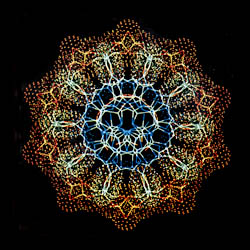As SJ1’s readership grew, so did the requests for a sequel. At first I only intended to release a revised edition and call it SJ2. And yet, all sorts of new information kept cropping up on the Pakistan story. My minor list of revisions soon became a monster file of notes which couldn’t be organised except in the form of a new book.
EVOLUTION
Then between late 2006 and mid-2007, two things happened to affect both the as-yet unwritten SJ2 and Systems. First, I came up with the ‘theorem’ for the novel in a kind of eureka moment, though this had been building up for some time. As I mentioned in Part 2, before this point my ‘ideal’ system model for the fictional Systems Experiment had been nothing more than a name. This was because I’d been semi-consciously aware that a fixed system was problematic. If I described the features of this system in the fiction in detail, it might be set in stone and treated as some fixed ideology. Fictional or not, I’d instinctively known I wanted to avoid that.
 The fact that an ideal system is never fixed (because evolution itself is a Natural Law) now registered in my conscious knowledge for the first time. This was thanks largely to my in-depth study of the Pakistan story and in particular the thoughts of Jinnah and Iqbal (in that order. Jinnah’s intelligence and acute ethical awareness remains greatly under-appreciated even among the experts). And so all the pieces came together. The idea (it had no name at first) was very simple and based on common sense. If you assume that everything in the universe has a common starting point of some sort, and you assume that the laws of nature also have the same starting point, then all ideals have the same starting point too … in principle. And just as the universe – with its zillions of atoms and subatomic particles and other seemingly separated bits and pieces called gravity and black holes and dark matter and space and time – actually remains one in principle, then all universal ideals must really be aspects or derivatives of a single common ideal.
The fact that an ideal system is never fixed (because evolution itself is a Natural Law) now registered in my conscious knowledge for the first time. This was thanks largely to my in-depth study of the Pakistan story and in particular the thoughts of Jinnah and Iqbal (in that order. Jinnah’s intelligence and acute ethical awareness remains greatly under-appreciated even among the experts). And so all the pieces came together. The idea (it had no name at first) was very simple and based on common sense. If you assume that everything in the universe has a common starting point of some sort, and you assume that the laws of nature also have the same starting point, then all ideals have the same starting point too … in principle. And just as the universe – with its zillions of atoms and subatomic particles and other seemingly separated bits and pieces called gravity and black holes and dark matter and space and time – actually remains one in principle, then all universal ideals must really be aspects or derivatives of a single common ideal.
I also remembered my old issue with that SJ1 appendix – the two irreducible ideals of justice and freedom. As it turns out, the two really are irreducible for reasons I won’t explain here, but whilst we often treat them as separate and ultimately incompatible, they really are not. In combination they represent one ultimate principle. I would later call this the Single Source Principle (though this part of the theorem was never explained in detail in the novel). Of course to many people it’s better known as Oneness, or Unity.
THE THEOREM
At any rate, I finally had the essence of a testable ‘theorem’ (for the fiction, at least). As I put it in Systems:
… justice and liberty are the only universal ideals; all other ethical principles are either derivatives or aspects of these ideals. But justice and liberty are themselves interconnected because they come, just like the physical universe and every law of nature, from a single source.
It seemed natural to call this relationship cohesive ethics; like a kind of ‘theory of everything’ for universal ideals. (I later tacked on the word ‘theorem’ in the novel for effect). To my mind, any social system built around the ideals of both justice and liberty together would be acting in harmony with the Natural Order and so was bound to succeed. Its exact structure – the minor details – wouldn’t matter. What would matter was its type … what it aimed for … its spirit … its ethical DNA. And by virtue of a beautiful accident, I already had the perfect name for this type of system: Libredux.
… a social system with no fixed rules, except for one binding principle which could not be broken under any circumstances.
Now I had almost everything I needed for the novel. But it still wouldn’t be finished for another five years.
CONSTITUTION
Second, in around May 2007 I had some interesting correspondence with the late Pakistani parliamentarian MP Bhandara, which led to my inadvertently becoming involved with his constitutional bill to make the 11 August 1947 speech of MA Jinnah a ‘substantive’ part of Pakistan’s constitution. Again, details aren’t important (though we’ll touch on it in the next part; the whole story is in SJ2’s appendix in any case). But that experience showed me just how important a strong constitution is. It also alerted me to the fact that something extremely important might be missing in Pakistan’s constitution – something that was leaving its fundamental sections open to misinterpretation.
Next: Pt 4 (final): Reversal
Earlier posts in this mini-series:
Introduction … Pt 1: The first book …
Pt 2: Libredux … Pt 3: The missing principle
(Some images in this post are copyrighted)





